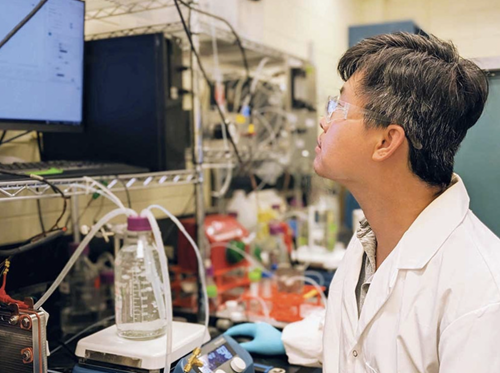CO2L Tech was established by three Vietnamese-origin scientists in Canada, with the ambitious goal of converting carbon emissions into new resource streams.
Dr. Nguyen Ngoc Tu, Dr. Tran Ly Nguyet Anh, and Dr. Dinh Cao Thang from Queen’s University Canada, boasting extensive experience in chemistry, material science, and chemical engineering, believed that the biggest challenge to the green economy is not only capturing carbon to reduce emissions but also determining how to put it to work. From this insight, CO2L Tech was set up, with Electrochemical CO2 Reduction (ECR) technology as its core foundation.
    |
 |
|
CO2L Tech startup joins hands with Helen Co., Ltd., a desiccant material manufacturer in HCM City, to carry out production in a trial basis at a Helen factory. (Photo: baodautu.vn) |
The technology demonstrates the natural photosynthesis process, where plants absorb CO2, water, and sunlight to produce oxygen and organic compounds. The ECR system uses renewable energy sources like solar and wind power to convert CO2 and water into economically valuable chemicals.
Unlike many ECR systems that rely on expensive and rare metals such as gold, silver, iridium, or platinum, CO2L Tech’s platform uses affordable and widely available materials, helping cut costs significantly. Besides, it directly handles impure CO2 streams, which many competing solutions cannot manage.
The technology was introduced at the Net Zero Challenge contest held by Touchstone Partners, Singapore-based Temasek Foundation, and the Ho Chi Minh City Institute for Development Studies last November. It was honored in the renewable energy and carbon neutralization category, winning the first place worth 5 billion VND (191,000 USD) and receiving 50,000 USD funding from Touchstone Partners Fund. Immediately afterwards, the team decided to bring this technology to Vietnam for commercial testing.
Dr. Anh revealed that after winning the award, the company established a partnership with Helen Co., Ltd, a desiccant material manufacturer in HCM City, to carry out production in a trial basis at a Helen factory. It installed equipment and conducted preliminary testing there. The team continues to build the electrochemical system to achieve a capacity of reducing more than 1 ton of CO2 a year for each ECR cell unit, envisioning an ECR system with an annual conversion capacity of up to 10,000 tons of CO2.
If the pilot production succeeds, CO2L Tech will open the first market for ECR technology in Vietnam, with products applied in the desiccant material sector, which currently needs carbon emission reduction solutions. This could also serve as a foundation for other industries.
Despite early momentum, CO2L Tech acknowledged that the road ahead is full of challenges. Market readiness is the primary challenge as most carbon capture and utilization (CCU) technologies still face high production costs. Without carbon pricing or emissions caps in place, CCU could not gain a competitive edge, making enterprises reluctant to invest in the area.
Beyond economic feasibility, green startups typically face pressure from factors such as technological, large capital requirements, policy uncertainty, and time. Meanwhile, the climate technology market hinges on national policies like carbon pricing and subsidies.
Ngo Thuy Ngoc Ty, Co-founder of Touchstone Partners, said Vietnam is among the countries first affected by climate change. With the potential to attract Vietnamese-origin researchers from around the world and its competitive production cost, the country is capable of becoming a launch pad for breakthrough initiatives and technologies for addressing global climate challenges.
Source: VNA